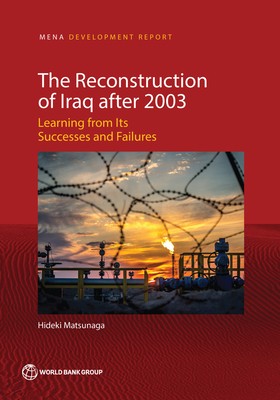
- We will send in 10–14 business days.
- Author: Hideki Matsunaga
- Publisher: World Bank Publications
- ISBN-10: 1464813906
- ISBN-13: 9781464813900
- Format: 17.8 x 25.4 x 0.7 cm, minkšti viršeliai
- Language: English
- SAVE -10% with code: EXTRA
Reviews
Description
Beginning in 2003, diverse and significant actors, both domestic and international, engaged
in reconstruction activities in Iraq. The total budget committed to Iraq's reconstruction was
unprecedented among postconflict operations mobilized by the international community. Despite the
vast sums of money spent, and the implementation of its many projects and programs, the donors and
the Iraqi people view the reconstruction efforts in Iraq in a negative light.
The Reconstruction of Iraq after 2003: Learning from Its Successes and Failures focuses on the period
between 2003 and 2014--that is, after the United States+"led invasion and overthrow of the Saddam
Hussein regime, and before the sudden rise of the Islamic State of Iraq and the Levant (ISIL), also
known as Daesh. This book assesses several dimensions of Iraq's reconstruction. First, it considers the
response of key international actors, such as the United Nations, the World Bank, the United States,
and other bilateral donors--specifically, the European Union, Japan, and the United Kingdom--as well
as nongovernmental organizations. Second, it analyzes the process and results of the reconstruction
of key sectors (electricity, oil, education, and health), and the interventions geared to institution
building and governance reform.
Pursuing effective reconstruction within the context of conflict and fragility is a formidable
challenge because of the uncertain, fluid, and complex environment. Based on the experience in Iraq,
how can the international community support the effectiveness and durability of reconstruction?
This book identifies lessons in seven areas and offers four recommendations for international and
domestic actors and citizens engaged in reconstruction activities.
The Reconstruction of Iraq after 2003 is important reading for development practitioners
and policy makers who are or will be engaged in reconstruction efforts in fragile and conflict-affected
environments.
EXTRA 10 % discount with code: EXTRA
The promotion ends in 21d.03:52:25
The discount code is valid when purchasing from 10 €. Discounts do not stack.
- Author: Hideki Matsunaga
- Publisher: World Bank Publications
- ISBN-10: 1464813906
- ISBN-13: 9781464813900
- Format: 17.8 x 25.4 x 0.7 cm, minkšti viršeliai
- Language: English English
Beginning in 2003, diverse and significant actors, both domestic and international, engaged
in reconstruction activities in Iraq. The total budget committed to Iraq's reconstruction was
unprecedented among postconflict operations mobilized by the international community. Despite the
vast sums of money spent, and the implementation of its many projects and programs, the donors and
the Iraqi people view the reconstruction efforts in Iraq in a negative light.
The Reconstruction of Iraq after 2003: Learning from Its Successes and Failures focuses on the period
between 2003 and 2014--that is, after the United States+"led invasion and overthrow of the Saddam
Hussein regime, and before the sudden rise of the Islamic State of Iraq and the Levant (ISIL), also
known as Daesh. This book assesses several dimensions of Iraq's reconstruction. First, it considers the
response of key international actors, such as the United Nations, the World Bank, the United States,
and other bilateral donors--specifically, the European Union, Japan, and the United Kingdom--as well
as nongovernmental organizations. Second, it analyzes the process and results of the reconstruction
of key sectors (electricity, oil, education, and health), and the interventions geared to institution
building and governance reform.
Pursuing effective reconstruction within the context of conflict and fragility is a formidable
challenge because of the uncertain, fluid, and complex environment. Based on the experience in Iraq,
how can the international community support the effectiveness and durability of reconstruction?
This book identifies lessons in seven areas and offers four recommendations for international and
domestic actors and citizens engaged in reconstruction activities.
The Reconstruction of Iraq after 2003 is important reading for development practitioners
and policy makers who are or will be engaged in reconstruction efforts in fragile and conflict-affected
environments.


Reviews